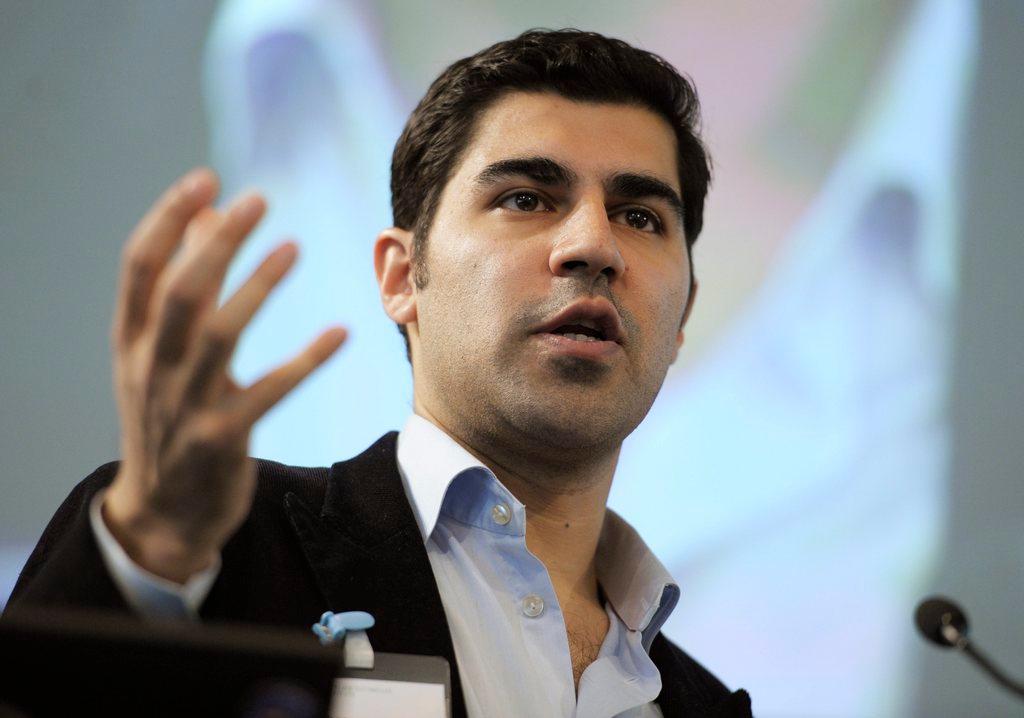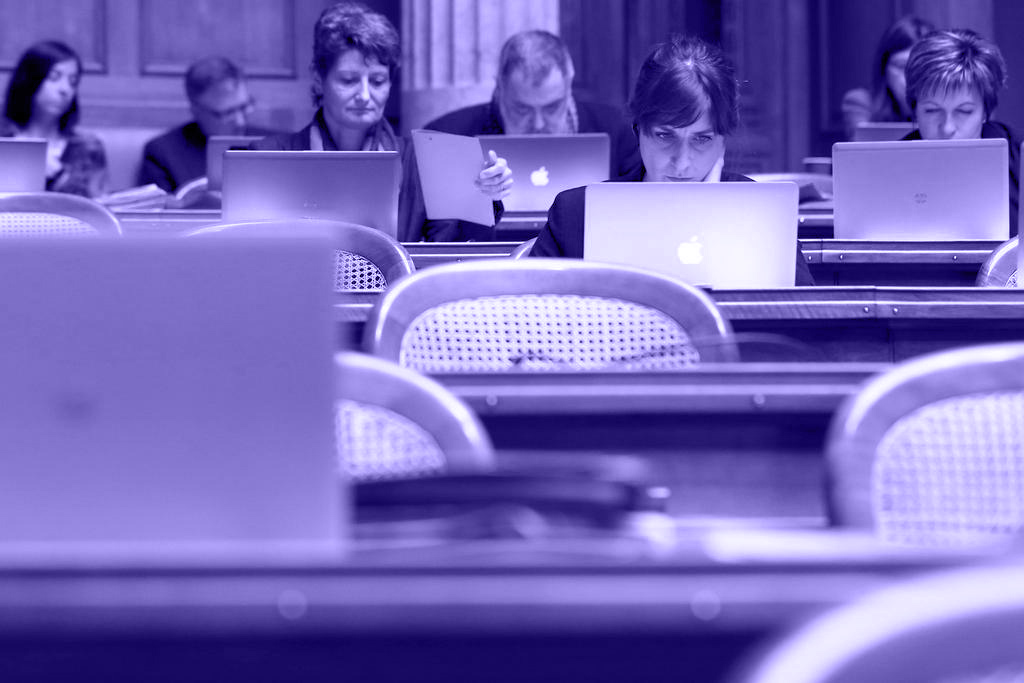A critic who misunderstands Swiss democracy

Democracy-bashing is in. Populists have done it for a while, now intellectuals have joined them. In his latest book, Parag Khanna propagates the ‘information state’, which is a hybrid of Swiss-style direct democracy and authoritarian technocrat regimes such as Singapore.
The book* reveals that the North American political analyst does not think highly of people’s participation. Let’s take a close look check some facts.
‘Against Elections’ by Belgian historian David von Reybrouck and Jason Brennan’s ‘Against Democracy’ are two publications reflecting a new wave of criticism against democracy seen from a scientific point of view.
Both books have unleashed a lively debate, a clear indication that time is right to suggest some radical democracy reforms aimed at limiting citizens’ participation.
Parag KhannaExternal link, political analyst and expert on geopolitics for the CNN news channel, has recently jumped on the bandwagon.
He considers “direct technocracy” to be the best form of government. In his book, he combines elements of direct democracies according to the Swiss model and technocracies such as Singapore. He has dubbed this ideal form of government the “Info-State”.
Singapore
In his book, which was recently translated into German, Khanna starts out with a declaration of love for Swiss democracy. This suggests his huge affinity for the Swiss model, where voters hold the power.
However, it does not take long for the reader to realise that Khanna’s real affection lies with the authoritarian city state of Singapore.
Not only are some of his statements clearly wrong, Khanna also makes important errors in reasoning.
#DearDemocracy highlights inconsistencies in five points.
This article is part of #DearDemocracy, a platform on direct Democracy issues, at swissinfo.ch.
1) “Democracy has to be seen not as a universal solution but a principle to be observed in the quest towards the higher objective of good governance.”
Khanna mentions this idea on several occasions. Here are a few historic facts: it’s true that with the introduction of the people’s initiative was linked to the hope for more prosperity through direct democracy.
But the monetary aspect is only secondary. What’s more important are the desires and concerns which are fed into the democratic process. “Democracy is no algorithm for efficient decision-making that is used to deliver incontestable results,” as the German-language Neue Zürcher ZeitungExternal link newspaper recently wrote.
Democracy is primarily an open and unbiased procedure or technique. Its legitimacy is directly related to the engagement of citizens who are affected by the democratic decisions.
Democracy is never primarily a means to achieve efficient governance.
2) The book also says there is no doubt that manipulations, tracking and controlling the Internet give governments an excuse to abuse their powers. And Khanna believes that the legitimacy of governments is not supported by such conduct. It is only supported once public concerns are registered and processed via the Internet.
This part is also very telling about Khanna’s bizarre interpretation of citizens’ participation and legitimacy. The political scientist recognises that the public’s desires and demands are the base of any government action.
However, these public demands are not discussed in controversial debates, be it at regulars’ tables in the local pubs, at public panels or on TV. And certainly not by going to the polls.
Khanna shows indeed appreciation for the citizen’s rights in Switzerland, but mainly for their educational impact. He propagates different methods for listening to citizens’ concerns by using big data instead of the ballot paper. And he suggest analysis of social media comments in real time.
Impressed by the efficiency of state administrations of authoritarian regimes such as China, Khanna calls for close observation by the government and taking control of the social media. Khanna, a citizen of the United States, argues that by censuring comments on networks such as Weibo and Wechat and sanctioning users, the Chinese authorities take criticism seriously about let’s say environmental pollution or corruption.
In Khanna’s opinion, the purpose justifies the means. This is a euphemism for police states trying to create transparent citizens is tantamount to calling for smart digital dictatorships.

3) The Swiss trust their direct democracy so much that they consider their parliament and its mediating role irritating. Only recently, an initiative aiming at abolishing parliament was launched in Switzerland, Khanna argues.
This statement is quite simply wrong. An initiative aiming at abolishing parliament has neither been launched nor submitted, according to René Lenzin of the Swiss Federal Chancellery in Bern. Khanna might be referring to a planned initiative aiming to distribute the seats in the House of Representatives by draw of lots.
This is exactly what Van ReybrouckExternal link is calling for. But even if the Swiss population accepted such a method, it would not mean scrapping parliament. The opposite is true. Surveys have shown that the Swiss have great confidence in their government and parliament, as the German-language Tages-Anzeiger newspaperExternal link reported.
4) Khanna says it’s not about constructing an algorithmic order; it’s about working with generative algorithms like in music or architecture, which are interactive and offer unlimited possibilities.
This is the only section in the book where Khanna makes concrete suggestions about what the proposed digital processing of citizen’s ideas would look like. He is almost euphoric about digitalisation and technological opportunities such as artificial intelligence that come with it.
However, his vision is naïve. He suggests using algorithms that do not discriminate against anybody, are unbiased and adapt automatically to the system at the same time. The catch is: such algorithms are utopian, at least for now!
Khanna also fails to be specific about what impact political positions have on agenda setting and how the will of the people is to be determined.
Assuming that there was a discussion on Facebook about immigration and the overall public opinion turns out to be negative. Would Khanna’s technocrats, – ideally be politically neutral expert -, view such an outcome as a decision by the people which must be implemented?
In his book, Khanna is stuck for an answer to any of these questions..
Digital direct democracy
In a time of virulent fake news, bots and Donald Trump’s excessive Twitter politics, political dialogue and digitalisation are becoming increasingly important.
This is Adrienne Fichter’s final contribution to a series looking at the influence and impact of digital technology on the systems and processes of direct democracy.
Votes in Switzerland are much simpler and unambiguous as they result in a binding Yes or No decision.
5) According to Khanna, the EU is accused of ‘democratic understanding’. In reality, the problem lies in the fact that technocrats in Europe do not have enough clout to impose political measures that would strengthen Europe, he argues.
With this statement, Khanna definitely reveals his affinity for a depoliticised technocratic state.
He believes more autonomy and power for officials and experts will directly lead to more prosperity and political agreement.
In Khanna’s perception, the alienation of European citizens is the result of unprofessional politics. With this statement, he simply denies the fact that many citizens would like to have a greater say in politics. Germany is the prime example for this, as the article in the newspaper Die WeltExternal link shows.
*Parag Khanna: Technocracy in America: Rise of the Info-State, 2017.External link
Translated from German by Billi Bierling

In compliance with the JTI standards
More: SWI swissinfo.ch certified by the Journalism Trust Initiative












You can find an overview of ongoing debates with our journalists here . Please join us!
If you want to start a conversation about a topic raised in this article or want to report factual errors, email us at english@swissinfo.ch.